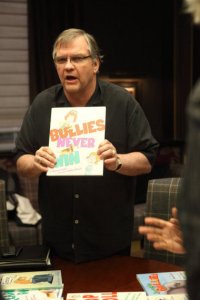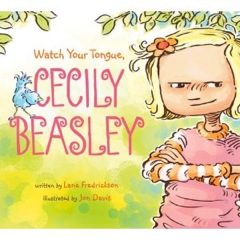 OK, silly title. And if anyone under 30 reads this post, they’re not gonna get the reference to Moon River.
OK, silly title. And if anyone under 30 reads this post, they’re not gonna get the reference to Moon River.
But heck, I like it, so off we go…
Many kidlit writers hear “don’t rhyme” from picture book editors. It’s not that editors hate rhyme (well, maybe SOME do), it’s just that they see badly-executed rhyme so often in the slush, it’s easier to discourage it. Common rhymes like “me, see” and “you, two” and other one-syllable predictability can kill the joy of a story.
 Remember “Celebrity Apprentice” when the men’s team gleefully authored “I know my A, B, C’s and my 1, 2, 3′s” as if it hadn’t been regurgitated in a googolplex of board books? They thought it was a rhyme worthy of victory and publication. Well, they did win the challenge, but the book Trump promised to publish was released by a vanity press, not a traditional publisher. No publisher was gonna touch it, ten foot pole or not.
Remember “Celebrity Apprentice” when the men’s team gleefully authored “I know my A, B, C’s and my 1, 2, 3′s” as if it hadn’t been regurgitated in a googolplex of board books? They thought it was a rhyme worthy of victory and publication. Well, they did win the challenge, but the book Trump promised to publish was released by a vanity press, not a traditional publisher. No publisher was gonna touch it, ten foot pole or not.
Editors also see a lot of rhyme with flawed meter. Meter is a tricky thing. There’s stressed and unstressed syllables, plus the lilt of natural speech patterns that can render your meter more choppy than Zoanette Johnson’s drumming. If you read your own rhyme aloud, you might not even hear how off it is, because you are forcing yourself to follow the pattern you created.
Then there’s the near-rhyme mistake, when the words don’t really rhyme at all, unless you twist your tongue or alter your accent. Like “hat” and “what” or “hat” and “back”. Once or twice and you can maybe get away with it. More than that and the editor may assume you need the WaxVac.
Moreover, writers can find their story dictated by rhyme, getting trapped in nonsensical situations simply because “dishwasher” rhymes with “impostor” (almost). It’s obvious when a plot decision has been forced based upon one word.
For these reasons, editors will advise, “don’t rhyme”.
For these reasons, author Lane Fredrickson created RhymeWeaver.com.
 Lane is the author of WATCH YOUR TONGUE, CECILY BEASLEY, a rhyming picture book with a joyfully jaunty rhyme. Remember as a child when you stuck out your tongue and a parent warned, “It will get stuck that way!” Well, Cecily finds herself in that very predicament. Hilarity ensues when a bird takes up residence on Cecily’s perfect pink perch. What’s Cecily to do?
Lane is the author of WATCH YOUR TONGUE, CECILY BEASLEY, a rhyming picture book with a joyfully jaunty rhyme. Remember as a child when you stuck out your tongue and a parent warned, “It will get stuck that way!” Well, Cecily finds herself in that very predicament. Hilarity ensues when a bird takes up residence on Cecily’s perfect pink perch. What’s Cecily to do?
Knowing the difficulty of rhyme for picture book writers, Lane created RhymeWeaver.com to teach the bard-challenged the complexities of rhyming well.
Lane, your rhyme is perfection! How did you get to be so good at it?
Ha. Thank you, Tara.
The short answer would be: a gnawing question and a genetic glitch.
But there is also the long answer. When I first joined SCBWI, everybody seemed to be telling everyone else NOT to write in rhyme, like there was a disease associated with it. You know, literary sarcoma or writer’s blockjaw. You almost didn’t want to admit you were a rhymer lest they sit in some quarantined section and slap a scarlet R on your forehead. The other thing I kept hearing was that a person’s rhyme had to be PERFECT. I wanted to write PERFECT rhyme, but I could never get a really good answer as to what PERFECT rhyme was. This is the kind of scenario that drives a slightly obsessive-compulsive person to behaving obsessively compulsive. So I googled around and studied my Seuss and found a website that offered critiques for $50. The critique, although well-intentioned, was just plain bad advice involving “counting syllables.” And don’t get me wrong, I’ve definitely given bad advice (but I’m pretty sure it was free when I did it). I totally get that sometimes bad advice seems good because it comes from multiple sources, but “counting syllables” is not the way to perfect meter and I had (being slightly obsessive compulsive) already figured that out. So I went back to school thinking I’d take a poetry class and clear up the PERFECT meter issue. But the thing about college is they don’t tell you what you want to know, they tell you whatever they want to tell you. So it took a BA in English and healthy stab at an MA in British Lit to figure it out that meter is a lot of things, but PERFECT is rarely one of them (I only stabbed at the MA, I haven’ t killed it yet).
 What inspired you to put all your rhyming knowledge into a website?
What inspired you to put all your rhyming knowledge into a website?
I watched a lot of people go through exactly what I went through: trying to figure out the rules, trying to decide if writing in rhyme was worth the stigma, trying to find complete resources that explained everything. I have a degree in psychology, where I focused on cognition and development (which is the opposite of those people who ask you to talk about your problems). Cognitive and developmental psychologists look at how people think and how they grow, mature, and learn. I knew that I could show meter in a way that’s visual and image-based. I knew that I could break it down into constituent parts in a way that I had never seen done. I knew that I could make it easier to grasp. But I wanted it to be free because I’m trying to improve the status of rhyme in the literary world and the more people who rhyme well, the less it looks like I have a disease.
Lane’s website has already helped this ruined rhymer who can’t hear meter even if I got whacked upside the head with it. So I encourage you to pay RhymeWeaver.com a visit, Pin it, share it, study it, LIVE IT. Children deserve better rhyming picture books like CECILY BEASLEY.
And hey, you can WIN CECILY! Just leave a comment telling me about the most interesting thing you learned at RhymeWeaver.com. A winner will be picked randomly in a week (or knowing me and prize distribution, two weeks).
So don’t hesitate, get out there and rhyme, oh Kate! (Sorry if your name isn’t Kate. I had to end on a rhyme.)



I love the ideas on that site! I just now enjoyed reading about syllables — stressed and unstressed — and pondering how to present it to my kindergartner. I’d love to be entered in the giveaway.
I learned that you could learn about meter and rhyme and it doesn’t have to come naturally. Will read this site over and over again until i understand it completely.
[...] RhymeWeaver, Wider than a Smile (plus a giveaway!) | Writing for Kids (While Raising Them). [...]
I just clicked on the tab for “Double Rhymes” and learned more about Masculine and Feminine endings. Bookmarked and plan to share. Thanks!
The judges at Rate Your Story thank you for posting this! Writers need to hear it.
What a smart idea for website! And how cleverly you present the information. You’re right–meter is an elusive skill. And its important to point out that there is a degree of subjectivity to it. While we can often agree on which syllables are stressed, sometimes people just have a quirky way of pronouncing things and sometimes people will emphasize different words in a string of monosyllabic words. Also, a certain amount of variation in meter helps add interest or make a particular point in your verse. While you must work to nail down the meter as clearly as you can, you’ll never be able to control it completely. Live readings will always bring variations.
Pinned, shared, studied…scared! That meter thang! Can hear it when it’s off, don’t notice when it’s on (good thing, right?), but figuring it can feel like learning tango steps without a partner! Since I am not done with all the goodies at RhymeWeaver, I’ll just mention here how I like learning about ‘almost rhymes’ – slanted, sloping, sloppy…not!
Another great post, Tara. Both you and Lane made me chuckle and, once again, provided some excellent information.
Lane’s site looks excellent! I love the pages on stressed and unstressed syllables. I’m seeing words a little differently now. The graphics seem to help the little light bulb in my head, not only turn on, but shine bright.
Thanks for posting about this site. I can’t wait to go through the whole thing.
Madeline
I have always enjoyed rhymes in children’s stories and now there is a source of information which will help perfect my own rhyming. Thank you, Lane for creating RhymeWeaver.com and thank you, Tara for bringing it to our attention!
Great post! And I love the new site… and I always knew about meter, but never saw it expressed as a function of stressed and unstressed syllables, metrical feet, and metrical lines. This will be a way cool site to explore!
Very helpful website Tara! And easy to navigate. I learned that rhymes ending on an unstressed syllable, are called Feminine Endings. Thanks for sharing
Great post Tara. I found Lane’s site a few weeks ago while trying to smooth out a rhyming PB story for 12×12. I hate that negativity exists in the publishing world with regard to rhyming stories (because I love them so much and I believe children do as well), but instead of trashing the piece, I sought ways to make it ‘perfect.’ It’s an extremely elusive concept to grasp, but Lane’s visual approach helped greatly. I’m happy I found RhymeWeaver.com and just know I’ll be popping in all the time. Thanks Lane; I would love to win Cecily!